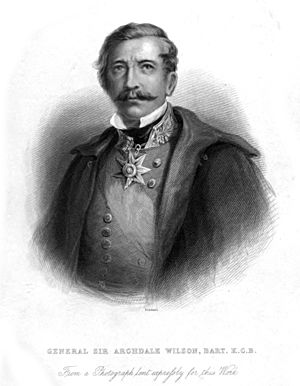Archdale Wilson facts for kids
Lieutenant-General Sir Archdale Wilson, 1st Baronet (1803 – 9 May 1874) was a brave British artillery officer. He served in the Bengal Army, which was part of the British forces in India. Sir Archdale Wilson was known for his actions during the Second Sikh War and especially during the Indian Rebellion of 1857. He played a key role in capturing Delhi and helping the British forces at Lucknow. For his courage, he received a special honor and was given the title of baronet. Later, he returned to the United Kingdom and became a high-ranking officer in the Royal Artillery.
Contents
Sir Archdale Wilson: A British Army Hero
Early Life and Military Training
Archdale Wilson was born in 1803 in a large family. He was one of thirteen sons! He went to school in Norwich, England. After his schooling, he trained at a special military college run by the Honourable East India Company. This company was a powerful British trading company that also governed parts of India.
At just eighteen years old, Wilson joined the Bengal Artillery. This was a branch of the British Indian Army that used cannons and other big guns. He arrived in India in 1819. Early in his career, he fought in the siege of Bharatpur and later in the Second Sikh War. Because he was skilled with artillery, he was given important jobs, like managing the Bengal Artillery and overseeing a cannon factory.
Role in the Indian Rebellion of 1857
In 1857, a major uprising happened in India against British rule. This event is known as the Indian Rebellion of 1857. At this time, Wilson was a Brigadier Commandant in the Bengal Artillery at Meerut. This was a military base where the rebellion first started on May 10, 1857.
The Meerut Outbreak
Some people criticized Wilson for not acting quickly enough in Meerut. This allowed many of the rebelling Indian soldiers, called sepoys, to escape to Delhi. However, Wilson soon led his troops into action. On May 30, he led his column to victory against the rebels between Meerut and Delhi.
Capturing Delhi
Wilson then joined a larger British force called the Delhi Field Force. Their commander, Sir Henry Barnard, sadly died soon after. Even though there were three more senior officers, Wilson was chosen to take command on July 17. Delhi was a very strong city, defended by about 30,000 rebel fighters. Wilson had only about 7,000 soldiers. He was also very unwell, but he bravely held his position.
On September 4, more heavy cannons and equipment, called a "siege train," arrived. With these new weapons, the British attacked Delhi. After six days of intense street fighting, Delhi was captured. This was a huge victory for the British.
The Relief of Lucknow
After Delhi, Wilson commanded all the artillery during the siege of Lucknow in 1858. His successes in both Delhi and Lucknow earned him great honors. He was made a Knight Grand Cross of the Order of the Bath, which is a very high award for a soldier. On January 8, 1858, he was also given the title of baronet. This is a special title of honor that can be passed down in a family. He also received a pension of £1,000 from the East India Company.
Later Life and Honors
Sir Archdale Wilson was married in 1842 to Ellen Frith. They did not have any children. When he passed away in 1874, his special title of baronet went to his nephew, Roland. Roland was the son of Archdale's eldest brother, George.
 | Calvin Brent |
 | Walter T. Bailey |
 | Martha Cassell Thompson |
 | Alberta Jeannette Cassell |


